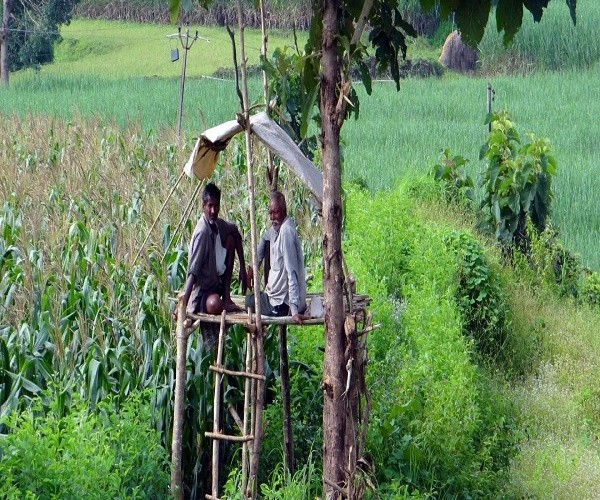Agricultural experts say that large corporations are being given ‘agricultural’ loans at cheaper interest rates and with easier regulations in the name of farmers. Government banks handed out Rs 58,561 crore to 615 accounts in agricultural loans in the year 2016. On average, each account has been given over Rs 95 crore in agricultural loans.
This information was revealed by the Reserve Bank of India in response to a Right to Information (RTI) application filed by #KhabarLive.
Agricultural loans incur lower interest rates as compared to other common loans, and they are also given under fewer preconditions than the average loan. These changes were made to make it easier to give loans to small and marginalised farmers. At the moment, farmers are given agricultural loans at the interest rate of 4%.
Kiran Kumar Veesa, the founder of the farmers’ organisation Rythu Swarajya Vedika, said, “Many big companies involved in agri-business are taking loans under the agricultural loans category. Companies like Reliance Fresh come under the agri-business company category. They engage in the buying and selling of agricultural produce, and take loans under the agricultural loans category for the construction of godowns or other such related activities.”
In order to give top priority and ensure the development of some economic sectors in the country, the RBI has issued a directive to banks that they invest a fixed part of their total loans into sectors like agriculture, micro, small and medium enterprises, export credit, education, housing, social infrastructure and renewable energy. This is called priority sector lending (PSL).
According to the PSL policy, banks are required to hand out 18% of their total loans to the agricultural sector, targeting small and marginalised farmers. Veesa told #KhabarLive, “The problem is that banks are giving a big percentage of this to corporate and big companies, as a result of which farmers are unable to avail these loans.”
He further stated, “Actually, it is pretty easy for big companies to take loans under the PSL policy as the regulations around giving the loans are lax and the interest rate is also quite low compared to general loans. Banks hand out big loans so that their resources remain intact.”
#KhabarLive also filed RTI inquiries in all zonal branches of the State Bank of India for state-wise data, but no branch except the Mumbai zone revealed the information. SBI Mumbai zone stated that the Mumbai City branch – one of the richest localities in Mumbai – has given out Rs 29.95 crore in loans to three accounts.
Going by these numbers, each account has been given almost Rs 10 crore on average in loans, whereas in the same branch, more than Rs 27 crore have been given in loans to nine accounts. However, the bank did not provide information on the names of the beneficiaries of these loans.
Agricultural expert Devendra Sharma has said that big corporations are being given loans at a cheaper rate after pronouncements in the name of farmers. “There is just the charade of solving farmers’ problems,” he said. “What kind of farmers are these who are being given Rs 100 crore in loans? This is all a show. Why is the industry being given loans in the name of farmers?”
Sharma says that banks also stand to benefit from this whole process, and that is why such massive loans are being given under the agricultural loans category. “Here, Rs 100 crore can easily be given to a company. If the same amount were to be given to farmers, at least 200 people would be required. Banks are giving out such massive loans so that their resources are depleted less and the target of 18% can be achieved soon.”
The National Democratic Alliance government had kept giving out Rs 8.5 lakh crore in agricultural loans in 2014-15, which has increased to Rs 11 lakh crore in 2018-19. However, data accessed by #KhabarLive from the RBI reveal that a big chunk of this is made up of massive loans. Agricultural experts say these loans are going to agri-business companies and the industrial sector.
Agricultural loans are given under three subcategories – agricultural debt, foundational agricultural infrastructure and supporting activities. Godowns and cold-storages fall under foundational infrastructure. For these, loans up to Rs 100 crore are given. Things like the setting up of agri-clinics and agri-business centres fall under supporting activities, and for these too the limit for loans is Rs 100 crore.
Data from the RBI reveals that massive amounts have been given to people in the name of agricultural loans even before 2016. In 2015, 604 accounts received Rs 52,143 crore, which comes to Rs 86.33 crore per account, whereas Rs 60,156 crore (at an average of Rs 91.28 crore per account) was given in agricultural loans in 2014. The same method was being followed during the UPA government as well.
Where 2013 saw 665 accounts receive Rs 56,000 crore at an average of Rs 84.30 crore per account in agricultural loans, 698 accounts received Rs 55,504 crore at an average of Rs 79.51 crore per account in 2012.
Kedar Sirohi, a farmer from Madhya Pradesh and a member of the Aam Kisan Union, is of the opinion that the government first traps farmers in a vicious cycle of debt, and when a farmer wishes to take a loan in order to do better financially, he is harassed by the banks. An ordinary farmer cannot even imagine that the government is handing out loans to the tune of hundreds of crores to big corporate companies after launching schemes in their name.
Sanjeev, a farmer, lives in Ittawa, Uttar Pradesh, and farms over four acres of land. He says that a chunk of agricultural loans is taken by the middlemen who help secure it. Some farmers take loans under duress as they don’t have money, but even for this, they have to make several rounds to the bank and face ridicule from the bank officials. It’s a mystery who these 615 account holders are, who have received so much money as agricultural loans.
Devendra Sharma says that the loans given to farmers and agri-business companies should be separated. Farmers should not be defrauded by giving companies loans under the ‘agricultural’ tag. Sharma said he had made this suggestion in front of the finance minister, but no reactions were received. #KhabarLive







